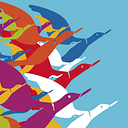Embracing Diversity
This is an excerpt from the Social dimension of Gaia Education’s Design for Sustainability curriculum.
Fostering Social Justice
Throughout history, we have used our ethnic, religious and cultural identities to separate ourselves from others. We have created cultural narratives of separation that in turn have alienated us from the wider community of life. This alienation has driven us to create cultures of control and manipulation (‘power over’) as we came to see the world as a place of scarcity and therefore of competition for limited resources.
There is, however, another way — the path of community that recognises our fundamental interconnectedness and interdependence. With the new and ancient story that is (re)emerging as multiple versions of the underlying narrative of interbeing, we are learning to embrace diversity as life’s treasure of abundance, vitality and resilience, rather than seeing it as a source of conflict or as a reason for top-down control.
Social justice issues need to be at the centre of community development of any kind, but especially where there is a tradition of injustice and segregation. It is common in urban areas of high-density population to find such separation of groups based on their social identity, core beliefs or ethnic origins. In cities around the world, people live in neighbourhoods with a specific identity and a specific group mind. These pose serious challenges to urban ecovillages and can make it difficult for them to participate in local government beyond the neighbourhood community.
But it is exactly at this level that policies and public funds are worked out and decided on, and this affects what happens in public spaces such as streets, pavements, vacant lots, schools, parks and a number of ‘common’ areas that need good administration, wisdom and flexibility.
By taking an activist approach to these issues ecovillagers, transition town groups or conscious citizens aiming to intentionally contribute to their community’s thriving can act to interrupt oppression, challenge racist or sexist attitudes and generally defend target groups and individuals, even when they cannot defend themselves. With empowered individuals, we can then build bridges of wellbeing and experience the transformative power of collective constructive action and solidarity.
Equal rights alone will not solve all problems. Is increased institutionalisation of children, elders and individuals with disabilities necessarily the best form of organisation? The institutionalisation of children may not be the only answer. The Scandinavian welfare states are thought by many to have found viable solutions and they have solved many problems, but marginalisation and loneliness cannot be dealt with purely by providing people with an income. A modernisation of the welfare state has taken place through private initiatives over the last 40 years and cohousing communities, especially for the elderly, and intentional communities have sprung up in great numbers in Denmark and are spreading to the whole world.
20 February is the World Day of Social Justice.
This is an excerpt from the Social dimension of Gaia Education’s online course Design for Sustainability.
If you would like to learn more about how to learn the skills to become a confident change maker in social issues of sustainability, then you should join our Social Design online course.
In the Social Design course, you will also learn more about how to deal with conflict and diversity — of ideas, beliefs, roles, etc., how to improve your communication skills and communicate in a more compassionate way, how to create a common vision for a collective project, and much more!
Read more about the upcoming Social dimension starting 12 October 2020 here!
If you register early, you are able to get a special discount.
If you liked this post and would like to see more posts like this, please clap by clicking the clap button below.
We would appreciate it if you would share this with your network.
Gaia Education is a leading-edge provider of sustainability education that promotes thriving communities within planetary boundaries.
